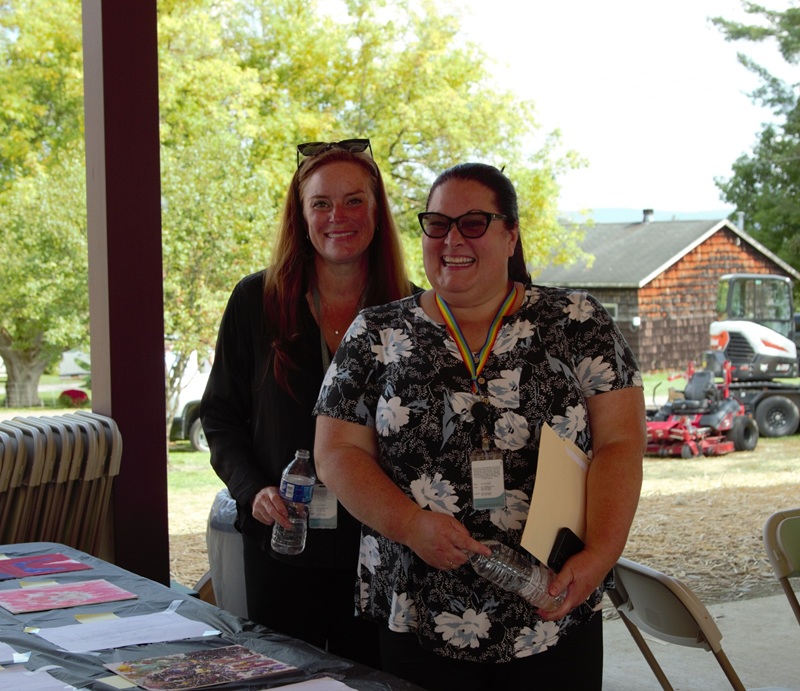No man is an island.
This principle is especially true at The William George Agency for Children’s Services (WGA), where adolescent youth receive intensive, out-of-home treatment services for behavioral, mental health and substance use challenges.
“Youth accepted into a WGA program are in need of a highly-structured, therapeutic environment,” says Brian Gee, LMSW. “Every day we work with an extraordinary group of young people whose personal histories have included some of the most unthinkable experiences. An important part of my job is to see that young people leave WGA with tools and experiences they can draw from to know what healthy, well-balanced relationships look like.”
Gee predominantly serves youth and families living in the Northern region of NY and is one of a dozen Family Services Coordinators at WGA. Family Services Coordinators communicate with family members about their child’s progress while at WGA and work directly with a child’s family to create a supportive home environment that’s best suited for their child’s continued progress. “It’s in no one’s best interest, especially a child’s, to have an unstructured environment,” explains Gee. “Our goal is to strengthen and increase healthy family dynamics upon return to the community.”
“Our job as Family Services Coordinators is to keep families informed of how their child is doing while in program and to offer support,” adds Family Services Coordinator Julie Owens, LMSW. “Every situation and family is unique. Sometimes support means being a good listener at the other end of the phone. Other times its advocating for reunification in the Family Court system. One day I could be helping by driving someone to an important medical appointment. The next by bringing groceries to a family struggling to make ends meet.”
Owens mainly serves youth and families in the Rochester area and is the longest-serving Family Services Coordinator at WGA with more than two decades of experience. She and her colleagues regularly communicate with OCFS (Office of Children and Family Services), Probation Departments, Family Courts, School Districts, and other human service agencies in New York advocating for the best interests of youth.
It can be difficult to build relationships with family members at first, acknowledges Owens.
“Many have been dealing with chronic issues and crises related to their child for years before finally accessing the level of care and specialized support their child needs. Family Services Coordinators work to earn the trust of families so that they can better understand their role in the therapeutic process and manage their expectations,” says Owens. “Learning to relate to each other after so much has come to pass between family members can be really hard. We’re not here to judge. We’re here to support.”
Support means being aware of the different issues impacting different communities as well as being culturally aware.
It can also mean having difficult conversations with family members about the readiness of a home for a child’s return, says Michelle Wayman, a WGA Family Services Coordinator for the Buffalo region.
Most times it’s about, “meeting families where they’re at,” explains Gee, “getting them to understand they’re never going to get where they want or need to be if they focus on the past.”
Anne McKane, Director of Developmental Achievement Services at WGA, sees support as helping to ensure young people leaving WGA have the continuity of care they need and are eligible to receive.
“It can be a cumbersome and complicated process to navigate the programs available to youth with disabilities,” says McKane. “Family Services Coordinators are integral in navigating the referral process for any and all services, whether helping to chase down old records or finding the support families need to get their child to the next stage of adulthood. At the end of the day, our goal is to connect youth with services that will advance their highest level of independence.”
In all cases, Family Services Coordinators work to get the best possible outcome for young people returning to their community. One of Gee’s most satisfying moments was helping a young man track down and reunite with a supportive relative who had moved out of state.
“We don’t just want families to know that we will advocate for them. We want them to be part of the process working to make their child’s life better,” says Helen M. Hulings, Executive Director of The William George Agency. “When people feel they are part of something, when they feel heard, it leads to better decision-making, shared ownership and sense of success.”
Pictured: Family Services Coordinators Julie Owens and Michelle Wayman at Family Day in 2024 on The William George Agency’s campus.
